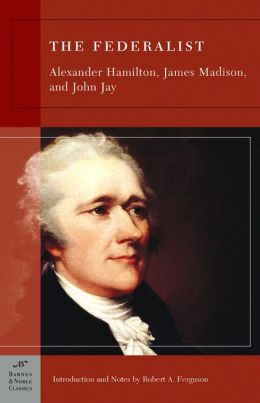- ISBN-13: 9781593082826
- Publisher: Barnes & Noble
- Publication date: 2/1/2006
- Series: Barnes & Noble Classics Series
- Pages: 560
Beginning with an assault upon the country's first constitution, the Articles of Confederation, the authors of The Federalist present a masterly defense of the new system. They comment brilliantly on the proper size and scope of government, taxation, impeachment, and many other issues of the day.
Written in haste and during a time of great crisis in the new American government, the articles were not expected to achieve immortality. Today, however, many historians consider The Federalist as the third most important political document in American history, just behind the Declaration of Independence and the Constitution itself. It has become the benchmark of American political philosophy, and the best explanation of what the Founding Fathers were trying to achieve.
For those of us unaware of United States history, let me sketch an incredibly rough portrait: following the Revolutionary War, it became increasingly clear that the Articles of Confederation, a proxy constitution thrown together to tie all the different states into an alliance and ensure some form of unity, would not suffice to maintain a stable government among the states. So a convention was called to write a constitution for the new-born country. There were many issues, naturally, but the biggest and most general was whether or not the federal (central) government would be strong or would be fairly weak. This resulted in a divide between the federalists, who wanted a strong central government capable of occasionally overriding states' laws, and the states-rights group, who wanted the power to rest in each individual state - which, if you haven't noticed, isn't really a united anything as much as a group of people who agree with each other, sometimes.
Into the fray jump three of the times most influential authors/statesmen: Alexander Hamilton, James Madison, and John Jay. Coming solidly down on the side of the federalists, and defending the Constitution that was at that time being written, reviewed, and voted on, these three published a series of papers under the collective name of "Publius" addressing each of the contentions of their opponents.
First, I would like to say that I love these three men. Alexander Hamilton, while a conniving, philandering ass at times, was brilliant. John Jay and James Madison, also, were brilliant. So this is a collection of gorgeous minds systematically arguing their point.
Who would read this collection of papers in the modern day? Very few, I imagine. Still, I think everyone would benefit from reading them, especially in the times in which we live. We need a reminder of the men who fought for our rights in the first place, why they fought, and what they were fighting for. We need a reminder of what the Constitution was originally meant to be and how far we have strayed from the ideals of the men who founded this country. Do I think they had it all right? Absolutely not. They weren't perfect, or seers of the future. They were men of their times. But I think the lessons they have to teach ring true even today, if we could just be bothered to pay attention to them.
Overall: A
There wasn't a ton of legal-ese or specialized jargon despite the positions these men occupied. Of course. They wanted to reach as broad an audience as possible. The headings are easy to follow, their arguments make sense and every once in a while they, especially Alexander Hamilton, can be downright sassypants, and I love that.
SIDE NOTE: Coincidentally, as I was reading this while in Japan, one of my Japanese friends had to read excerpts from The Federalist for her English class. Haha, what?

No comments:
Post a Comment